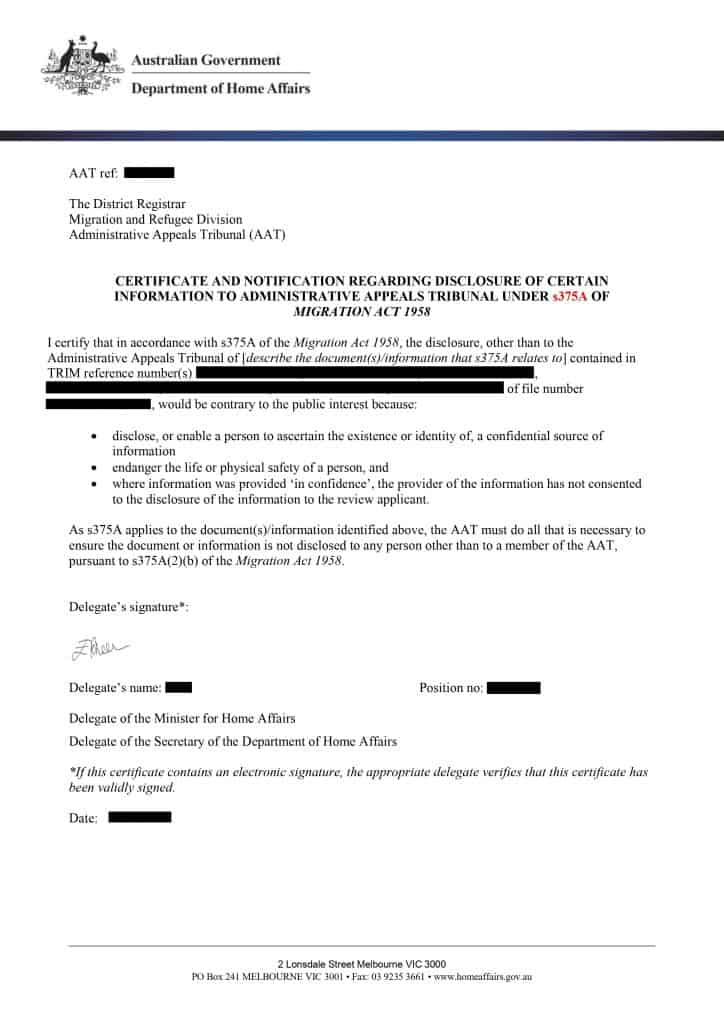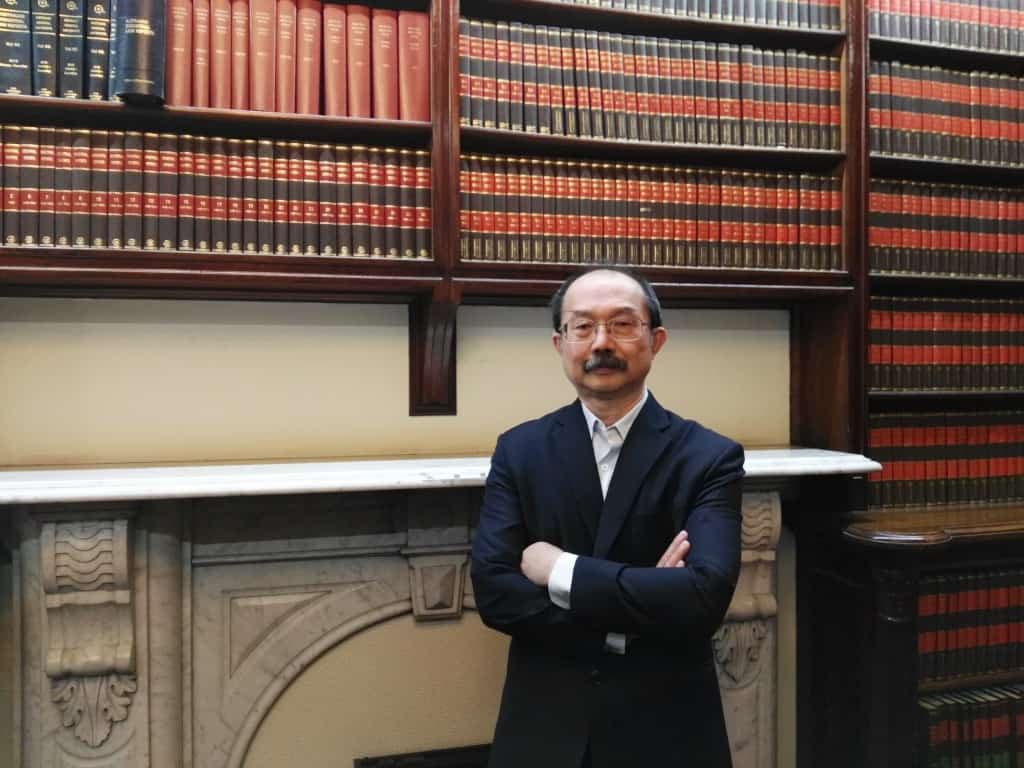
Section 375A certificate is a power under section 375A of the Migration Act 1958 given to the Minister or delegate for Immigration to place restrictions on material or information given to the AAT by the Department.
The power under section 375A allows the Minister by certifying, in writing, that disclosing the material or info is contrary to the public interest. What this mean is that the material or info given by the Department to the AAT is given in confidence by the provider of the material or info to the Department.
The Minister has the power under section 375A, section 376 (in relation to Part 5 reviewable decisions) and section 438 (in relation to Part 7 reviewable decisions) to issue a certificate prohibiting the AAT to disclose the material or information given by the Department when reviewing your AAT review application (click here to learn more about AAT reviewing a Dept’s decision to cancel or refuse a visa). This certificate is known as non-disclosure certificates.
If the AAT provide you with a section 375A certificate, the Tribunal may tell you whether they believe the certificate is valid or not. The Tribunal is required to ensure that the certificate has been issued correctly because acting on an invalid certificate may lead to a jurisdictional error because it has to act according to law (MZAFZ v MIBP [2016] FCA 1081). It is important that the Tribunal’s disclosure to you must be sufficient and adequate to enable you to consider whether to challenge the validity of the certificate. In addition, the Tribunal must also disclose to you that it intend to rely on the adverse material or information covered by the certificate otherwise it can give rise to practical injustice to you as you are denied the opportunity to consider whether you could or should challenge the certificate, or seek access to the material or info, or apply to the Tribunal, as constituted, to disqualify itself on the basis of apprehended bias (Singh v MIBP [2020] 783 at 69).
The section 375A certificate is generally issued on the basis that the release of the material or info covered in the certificate must not be revealed to anyone other the Tribunal member reviewing your case. The revealing of the material or info is not in the public interest for it to be disclosed. Hence, the certificate must properly specified in the certificate a public interest reason why the material or info must not be disclosed to you (MZAFZ v MIBP [2016] FCA 1081). Even if the material or info received by the Department was given in confidence, they must actually have been given in confidence.
The Tribunal will provide you with the opportunity to comment if you think the certificate is not valid.
If the AAT received a section 375A certificate it must tell you so as the Tribunal has an obligation of procedural fairness to disclose that it has received a non-disclosure certificate. A breach of this obligation may result in jurisdictional error if the breach deprived you of the possibility of a successful review (MIBP v SZTA; CQZ15 v MIBP; BEG15 v MIBP [2019] HCA 3) or cause you practical injustice, for e.g., the material or info listed in the certificate is relevant to your review (MIBP v CQZ15 [2017] FCAFC 194).
The section 375A certificate must include a statement that the material or info must only be disclosed to the AAT, that is, the Tribunal must not disclose the same material or info to anybody other than to the Tribunal member who is reviewing your case (s 375A(1)(b) and (2)(b)).
Section 375A certificate validity
When a section 375A certificate is issued by the Department, the certificate must specify the reason why the disclosure of the information or documents would be contrary to the public interest.
In some circumstances the AAT will need to look at the information or document covered by the section 375A certificate to determine whether they fall within the stated public interest reasons, therefore whether the certificate is valid or not (Akter v MIBP [2018] FCCA 3604). Material or information, such as Facebook posts, that are available publicly are usually not confidential, hence revealing them to you would not be contrary to the public interest.
The test whether a section 375A certificate is valid or not is whether the non-disclosure is for public interest immunity (Singh v MIBP [2017] FCCA 1331).
What is public interest immunity?
Generally, public interest immunity restricts the making or disclosing of relevant evidence as it would be against the public interest.
In deciding whether public interest immunity would apply depend on (Sankey v Whitlam (1978) 142 CLR 1):
- no harm should be done to the nation or to the public service by the disclosure of the doc or info; and
- the administration of justice would not be frustrated by withholding of the doc or info which must be disclosed if justice is to be done.
Usually, a section 375A certificate is issued to prevent or restrict the release of dob-in information given to the Department or the Department methods used for doc examination or identity verification. Hence, a section 375A certificate is used to encourage people to provide dob-in information. Usually, the consent of the person providing the dob-in information is required to be given to the review applicant and if no consent is provided, the information cannot be disclosed (Ahmad v MIBP [2015] FCCA 1038).
With regard to material or info provided by a third party, such as dob-in, it is generally considered that releasing the material or info to you is contrary to the public interest. This is because the material or info would reveal the identity of the informant. However, not every disclosure will be contrary to the public interest unless the certificate states that the material or info was provided by a third party or the material or info were not obtained from the internet by the Department (Singh v MIBP [2020] FCA 783 at [57]).
It is important that there must be rational or logical basis for the Department to issue the section 375A certificate and disclosing the material or info would be contrary to the public interest.
When is a section 375A certificate invalid?
A section 375A certificate is usually considered to be valid if a public interest reason is clearly specified in the certificate. The public interest reason must be of sufficient detail to identify the claimed harm to the nation or public service that its release could lead to.
However, regard will need to be had to the material or info covered by the section 375A certificate to establish whether they fall within the stated public interest reason. If it does not, then the certificate may not be valid (Akter v MIBP [2018] FCCA 3604). Furthermore, section 375A power to issue the certificate, like any other statutory power or discretion, must be exercised reasonably (Minister for Immigration and Citizenship v Li (2013) 249 CLR 332; MIBP v SZMTA (2019) 264 CLR 421). Therefore, the certificate can only be issued if there is at least probative, rational or logical basis for finding that the disclosure would be contrary to the public interest. If the certificate is issued arbitrary, irrationally or illogically is invalid on the ground of legal unreasonable, even if the disclosure was contrary to the public interest (Singh v MIBP [2020] FCA 783 at [55]).
A section 375A certificate which does not contain sufficient detail to properly identify a basis of public interest immunity may render the certificate invalid. In short, the certificate should identify the harm that could be done if the material or info is disclosed (MZAFZ v MIBP [2016] FCA 1081.
In addition, for a section 375A certificate to be valid, it must be dated and signed by the delegate (El Jejieh v MHA (No. 2) [2019] FCCA 840).
If section 375A certificate is invalid, can it be re-issued?
If the AAT considered the certificate to be invalid, it may ask the Department to reconsider it (BIE15 v MIBP [2016] FCCA 2978). The Department may revoke it if there is no valid basis or re-issue it after rectifying the problem.
Getting around section 375A certificate
You may be able to get around the non-disclosure requirement in a section 375A certificate by requesting the AAT to provide you with info pursuant to section 359A (if it is a Part-5 reviewable decision) or section 424A (if it is a Part-7 reviewable decision). Section 359A requires the Tribunal to provide you with clear particulars of any info that it considers would be the reason, or a part of the reason, for affirming the decision unreview and to invite you to comment on or respond to the adverse info.
Section 359A and section 424A do not apply to info that is non-disclosable info if they do not satisfy the public interest test or was not given in confidence.
When there is a conflict between section 375A and section 359A, section 375A is the leading provision even though both can usually be served without conflict (MIBP v Singh [2016] FCAFC 183).
When making a section 359A request, the Tribunal must consider how to provide sufficient particulars of the info (like a gist of the info) to you in order to comply with its section 359A obligation (Burton v MIMIA (2005) 149 FCR 20 – section 359A is not subject to section 375A).
You may also request the AAT, under section 362A, to access written material held by the Tribunal. However, the Tribunal will not release info covered by section 375A certificate. The AAT will allow you to make submissions about it decision not to disclose the material subject to the section 375A certificate (MZAFZ v MIBP [2016] FCA 1081).
Australian migration law is complex and difficult to understand, contact our immigration lawyer for a consultation ((fee applies) regarding section 375A certificate.

 041 222 4020 or WeChat: AUDvisa
041 222 4020 or WeChat: AUDvisa
This article is not intended to be or taken as migration legal advice. The author of this article disclaims any liability for any action or omission on the information provided or not provided in this article. You should always consult an immigration lawyer or a registered migration agent to form an informed opinion on your immigration matter.



